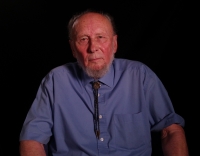We will never forget how we hurt you

Download image
Stanislav Žalud was born February 22, 1932 in Přerov into a family of a music teacher and choirmaster Stanislav and Anna, née Janoušková. He grew up in an apartment in the Smetana street together with his two sisters – Jarmila and Eva. Owing to his father’s influence he learned to play a number of musical instruments but eventually stuck to guitar. As a six-year-old he joined the Junák group in Přerov. However, Junák was banned soon after, so he had to wait for his first Scout camp until 1945. He had been apprenticed as a bricklayer before graduating from a secondary technical school of engineering in Prostějov. After his graduation in 1952 he was admitted to Brno University of Technology, majoring in architecture at the Faculty of Civil Engineering. In 1952 he married Věra Hůlová. He then got a job as a teacher of technical subjects at a technical school in Lipník nad Bečvou, worked as a project manager at the Regional construction company Přerov, taught at the evening technical school in Přerov and was the head of the special planning department at the Regional National Committee in Vyškov. While working he also managed to graduate from the University of Economics, Prague. Between the years 1968 and 1971 he worked first as the head of the Department of Investment in the Pal company and later as the chief district architect in Nový Jičín. Later he worked as a preservation architect in a city museum and had also other jobs from which he was always fired eventually. He founded the Club of Committed Non-Party Members in Nový Jičín in 1968 and was also active in the second renewal of the local Scout movement. From 1970 he was on the radar of State Security and a surveillance file was kept on him (category NO3 – hostile person). He left Nový Jičín with his family because of the attacks and threats. The secret file in question was shredded in December 1989. After returning to his hometown, he went through several jobs. He designed both family and agricultural houses, industrial and breeder’s buildings. He founded a horse buildings design studio within the national Czech Breeding Company. He was tied down professionally for most part of the Normalization period due to his civic attitudes. He was expelled from the Union of Architects, and the regime also tried to lure him out of the country during the ‘Asanace’ campaign. Nevertheless, he continued engaging himself socially and organized lectures on architecture in the club of a chemical plant and elsewhere. He managed to get and reconstruct the building of a historical windmill that became an island of freedom for him and a wide range of his friends. During the Velvet Revolution he was present at the birth of the Civic Forum in Přerov. He became its spokesperson and was co-opted onto the Regional National Committee on behalf of the Civic Forum. In 1990 he was elected to the parliament and later co-founded the Civic Democratic Party after the Civic Forum had split. He remained in his post after the second election in 1992 and had been a board member of the Federal Assembly until the break-up of the Czechoslovak republic. He was engaged in politics for several years after that, serving as a deputy minister or advisor to a minister. After the so-called Sarajevo assassination, he became one of the first members of the Freedom Union. As of 2019, he is not a member of any political party. For many years he was the chief of old-scouts in the Association of Scouts and Guides of the Czech Republic. He left Junák after a conflict at the tribal assembly in Moravská Třebová in 1998 – the assembly that led to the restoration of the Association of Scouts and Guides of the Czech Republic. He died on November 14th, 2023.
